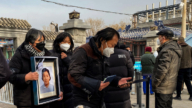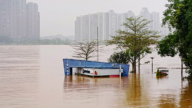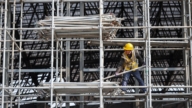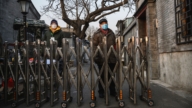【新唐人2013年05月14日訊】當前,大陸各地掀起了史無前例的城市化運動,30年中,有5億人遷入城市,到2030年,中國城市人口將佔全球人口的1/8。美國一位政治學者在研究近百個世紀的獨裁政權後發現,城市人口高度集中在大都市的獨裁國家,往往政權垮臺的速度比平均水準快4年、垮臺機率高60%。主要原因是,超大型城市會將大量民眾聚集在一起,並使得民眾更容易的組織起來,以及舉行抗議活動。究竟中國城市化發展隱藏著哪些風險﹖下面請看專家的解析﹕
在《中國十億城民:人類歷史上最大規模移居背後的故事》一書中,長期生活在北京的記者湯姆米勒,深入考察中國在急於城市化的道路上誤入歧途的原因。他認為,中國很大一部分經濟增長受到城市建設推動,但是,當建築活動在約20年後趨緩時,產生的風險就是:城市裡充斥著龐大貧民窟。
分析說,真正令人擔憂的是,在這些無序擴張的城市吸引到足夠的市民後,城市所提供的生活質量將是低下的,這將促成分裂的社會,和無法兌現承諾的經濟。
評論人士認為,城市化引發中國社會變革的可能性極大,農村人口和城市的中產階級,都有可能成為引爆中國大規模轉型的導火線,但哪一個會提前點燃,目前還是個未知數。
紐約城市大學政治學教授夏明:「從今年開始,中國已經50%以上的人口是生活在城市了,也就是說在中國也就是有7億人口生活在城市裡邊,顯然急劇的城市化過程,會帶來許多的不穩定和衝突,城市化本身,它就會帶來群體事件,甚至革命的可能行。」
夏明分析,隨著網路資訊的日益發達和普及,越來越多的農民在觀念和知識上發生巨大變革,新一代的農村青年不再以傳統的種田為生,而是選擇進入城市打工,加上與城市的聯絡越發頻繁,今天的農民已經不是人們傳統理解的那種愚昧、落後、知識封閉的人群。
夏明:「農民對外部世界生活的水準和生活質量的了解,同時對城市人口甚至國外的生活境況、他們權力和自由發展機會的了解,使得農民應該是有更強烈的自由的意識、法制意識和維權的意識。」
夏明指出,能夠造成農村人民爆發的因素有兩個,一是,中共當局對農民的殘暴壓榨和野蠻執法,二是,農民意識的覺醒。
經濟時政評論家草庵:「民眾的聚集就會讓信息傳播的更加通暢,而且更加有目地性。這會讓他們對社會的文明制度和自己的權益認識的更加深刻,他們更願意通過各種抗議實現自己的目標和理想。」
在中共當局大力推動城市化進程中,同樣受到影響的第二大群體就是城市中產階級。夏明指出,中國的中產階級大部分是國家的公務員和專業人員,由於高度依賴國家政權,他們在過去的30年一直比較安靜。但隨著近年來中共不計後果發展經濟、追求GDP,加上人口高度密集,越來越多的問題開始威脅到城市中產階級。
夏明:「我們看關於環境污染、關於處置垃圾、關於有毒的或者有污染的各種項目的上馬等等,還有關於高速公路或者高鐵,還有像上海磁懸浮,這些工程對人體的影響,尤其是環保、生活質量問題,包括還有禽流感等等,都可能引發中產階級的反抗。」
另外,美國俄亥俄州立大學(Ohio State University)的政治學者華萊士(Jeremy Wallace) 則對美國《華爾街日報》說,我確實認為中國領導人擔心,城市失業問題會影響社會穩定,因為失業有可能破壞經濟增長,並最終危及政權生存。
採訪/劉惠 編輯/張天宇 後製/李月
China’s Urbanization Development with Constant Political Risks
Unprecedented urbanization is happening across China.
In the last 30 years, 500 million people have moved into cities.
By 2030, China’s urban population will account for
1/8 of the world’s population.
A U.S. political scientist held a study on countries
ruled by dictatorships in the past century.
The study found that dictatorship regimes with a concentrated
urban population often collapse four years faster than average,
and with a 60% higher probability to collapse.
The main reason is that mega-cities put people close together,
so it’s easier for people to organize and protest.
Let’s see what some of the experts have to say about the risks
hidden in China’s urban development.
In the book China’s One Billion City Population:
Story of the Largest Human Relocation in History,
reporter Tom Miller, who lived in Beijing for many years,
did an in-depth study of the wrong paths taken
in China’s rush to urbanization.
He believes that a large part of China’s economic growth
is driven by urban construction.
But once the construction slows down in about 20 years,
there is a risk of huge slums in cities.
The analysis says the real concern is after cities growing in an
unhealthy way get many citizens, their quality of life will drop.
It would result in a divided society,
and failure to fulfill economic commitments.
Commentators believe the possibility of social change
led by urbanization is very high.
Rural population and the urban middle class are both likely
to be the fuse of China’s large-scale transformation.
It’s unknown which one will be lit first.
Professor of Political Science Xia Ming at City University
of New York: “Since beginning this year, more than 50% of
China’s population lives in cities.
That means 700 million people in China live in cities.
It is obvious that the rapid process of urbanization
will bring instability and conflict.
Urbanization itself may bring mass incidents
or even revolution."
Xia Ming says that along with the increasingly
advanced and popular online information, more and more
farmers are going through tremendous changes
in their concepts and knowledge.
The new generation of young people in the countryside
no longer work as farmers.
They choose to work in cities instead.
With more frequent contact with the cities,
today’s farmers are no longer a group of people
known for ignorance, backwardness and introversion.
Xia Ming: “With farmers’ knowledge of the outside world
and the quality of life in the cities’,
as well as their understating of rights and freedoms,
farmers should have a stronger sense of freedom,
rule by law, and protection of their rights."
Xia Ming pointed out two factors that can
cause the outbreak of the rural people:
the first is the Chinese Communist Party (CCP) authorities’
brutal crushing of farmers and brutal law enforcement;
and secondly, the awakening of farmers’ consciousness.
Cao-An, economic and political critic:
“The gathering of people will allow more smooth
and purposeful dissemination of information.
This will give them a deeper understanding of
social civilization and their own interests.
So they will be more willing to realize their goals
through a variety of protests.”
The second largest group impacted by CCP’s
vigorous promotion of urbanization is the urban middle class.
Xia Ming pointed out that a majority of China’s middle class
is composed of government civil servants and professionals.
They are highly dependent on the state power.
In the past 30 years they have been relatively quiet.
With the CCP’s reckless economic development in past years
and high population density, more and more problems
begin to threaten urban middle class.
Xia Ming: “We see projects around environmental pollution,
garbage disposal, and highway or high-speed rail, etc.
These projects impact human health.
Issues around environmental protection, quality of life,
bird flu, etc., may lead to the revolt of the middle class."
Ohio State University political scientist Jeremy Wallace
told The Wall Street Journal that Chinese leaders are worried.
He says urban unemployment could impact social stability,
and that unemployment may undermine economic growth.
Which endangers the survival of the regime, in the end.



























